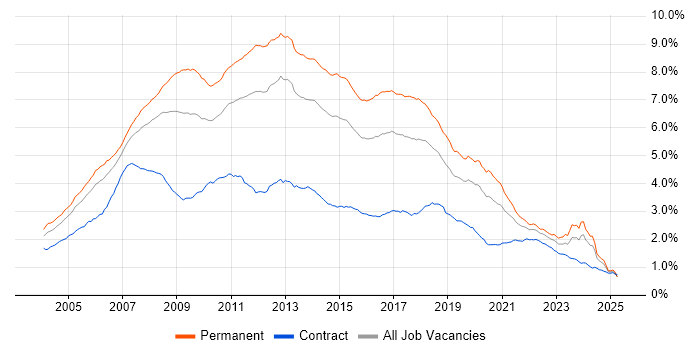.NET Developer
UK > England
The median .NET Developer salary in England is £60,000 per year, according to job vacancies posted during the 6 months leading to 28 May 2025.
The table below provides salary benchmarking and summary statistics, comparing them to the same period in the previous two years.
| 6 months to 28 May 2025 |
Same period 2024 | Same period 2023 | |
|---|---|---|---|
| Rank | 386 | 88 | 183 |
| Rank change year-on-year | -298 | +95 | -12 |
| Permanent jobs requiring a .NET Developer | 326 | 2,487 | 1,684 |
| As % of all permanent jobs advertised in England | 0.67% | 2.81% | 1.93% |
| As % of the Job Titles category | 0.74% | 2.97% | 2.11% |
| Number of salaries quoted | 295 | 2,392 | 1,524 |
| 10th Percentile | £42,500 | £39,000 | £41,250 |
| 25th Percentile | £47,500 | £45,000 | £48,750 |
| Median annual salary (50th Percentile) | £60,000 | £60,000 | £60,000 |
| Median % change year-on-year | - | - | +9.09% |
| 75th Percentile | £75,000 | £70,000 | £76,250 |
| 90th Percentile | £95,000 | £80,000 | £92,675 |
| UK median annual salary | £57,500 | £60,000 | £60,000 |
| % change year-on-year | -4.17% | - | +9.09% |
All Permanent IT Job Vacancies
England
For comparison with the information above, the following table provides summary statistics for all permanent IT job vacancies in England. Most job vacancies include a discernible job title that can be normalized. As such, the figures in the second row provide an indication of the number of permanent jobs in our overall sample.
| Permanent vacancies in England with a recognized job title | 43,919 | 83,679 | 79,671 |
| % of permanent jobs with a recognized job title | 90.79% | 94.64% | 91.48% |
| Number of salaries quoted | 23,116 | 62,210 | 50,998 |
| 10th Percentile | £29,250 | £28,500 | £32,750 |
| 25th Percentile | £41,250 | £38,084 | £45,000 |
| Median annual salary (50th Percentile) | £56,000 | £52,500 | £60,800 |
| Median % change year-on-year | +6.67% | -13.65% | +1.33% |
| 75th Percentile | £75,000 | £71,250 | £81,250 |
| 90th Percentile | £97,500 | £90,000 | £100,000 |
| UK median annual salary | £55,000 | £52,500 | £60,000 |
| % change year-on-year | +4.76% | -12.50% | - |
.NET Developer
Job Vacancy Trend in England
Job postings that featured .NET Developer in the job title as a proportion of all IT jobs advertised in England.

.NET Developer
Salary Trend in England
3-month moving average salary quoted in jobs citing .NET Developer in England.
.NET Developer
Salary Histogram in England
Salary distribution for jobs citing .NET Developer in England over the 6 months to 28 May 2025.
.NET Developer
Job Locations in England
The table below looks at the demand and provides a guide to the median salaries quoted in IT jobs citing .NET Developer within the England region over the 6 months to 28 May 2025. The 'Rank Change' column provides an indication of the change in demand within each location based on the same 6 month period last year.
| Location | Rank Change on Same Period Last Year |
Matching Permanent IT Job Ads |
Median Salary Past 6 Months |
Median Salary % Change on Same Period Last Year |
Live Jobs |
|---|---|---|---|---|---|
| London | -134 | 98 | £80,000 | +14.29% | 32 |
| North of England | -203 | 86 | £60,000 | +9.09% | 68 |
| North West | -163 | 63 | £60,000 | +14.29% | 32 |
| South East | -180 | 56 | £53,375 | -11.04% | 43 |
| Midlands | -130 | 35 | £52,500 | - | 29 |
| East of England | -98 | 28 | £53,000 | -11.67% | 10 |
| West Midlands | -51 | 23 | £57,500 | +9.52% | 17 |
| South West | -51 | 19 | £51,250 | -10.87% | 18 |
| Yorkshire | -79 | 16 | £65,000 | +18.18% | 13 |
| East Midlands | -68 | 12 | £46,250 | -7.50% | 11 |
| North East | -28 | 7 | £100,000 | +66.67% | 24 |
| .NET Developer UK |
|||||
.NET Developer Skill Set
Top 30 Co-occurring Skills and Capabilities in England
For the 6 months to 28 May 2025, .NET Developer job roles required the following skills and capabilities in order of popularity. The figures indicate the absolute number co-occurrences and as a proportion of all permanent job ads across the England region featuring .NET Developer in the job title.
|
|
.NET Developer Skill Set
Co-occurring Skills and Capabilities in England by Category
The follow tables expand on the table above by listing co-occurrences grouped by category. The same employment type, locality and period is covered with up to 20 co-occurrences shown in each of the following categories:
|
|
||||||||||||||||||||||||||||||||||||||||||||||||||||||||||||||||||||||||||||||||||||||||||||||||||||||||||||||||||||||||||||||
|
|
||||||||||||||||||||||||||||||||||||||||||||||||||||||||||||||||||||||||||||||||||||||||||||||||||||||||||||||||||||||||||||||
|
|
||||||||||||||||||||||||||||||||||||||||||||||||||||||||||||||||||||||||||||||||||||||||||||||||||||||||||||||||||||||||||||||
|
|
||||||||||||||||||||||||||||||||||||||||||||||||||||||||||||||||||||||||||||||||||||||||||||||||||||||||||||||||||||||||||||||
|
|
||||||||||||||||||||||||||||||||||||||||||||||||||||||||||||||||||||||||||||||||||||||||||||||||||||||||||||||||||||||||||||||
|
|
||||||||||||||||||||||||||||||||||||||||||||||||||||||||||||||||||||||||||||||||||||||||||||||||||||||||||||||||||||||||||||||
|
|
||||||||||||||||||||||||||||||||||||||||||||||||||||||||||||||||||||||||||||||||||||||||||||||||||||||||||||||||||||||||||||||
|
|
||||||||||||||||||||||||||||||||||||||||||||||||||||||||||||||||||||||||||||||||||||||||||||||||||||||||||||||||||||||||||||||
|
|
||||||||||||||||||||||||||||||||||||||||||||||||||||||||||||||||||||||||||||||||||||||||||||||||||||||||||||||||||||||||||||||
